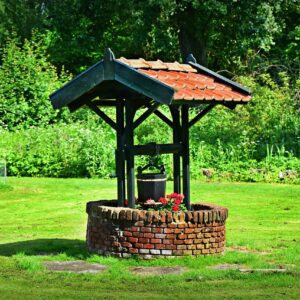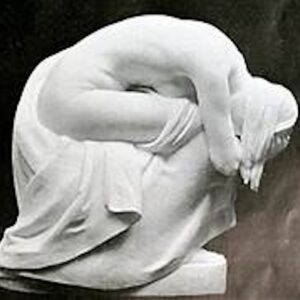“You were adored at work,” my friend says. She is speaking to her husband, a family physician who retired a few years ago, and to me, recently retired. Our wives agree that they can’t—they won’t—adore us the way our patients, students, colleagues, and communities had adored us. The emptiness I’ve been feeling: now I know why, at least one of the reasons why. My friend named it.
I could turn away from the emptiness, or, like a priest, I could enter it. Once a year, on Yom Kippur, the High Priest entered emptiness, the Holy of Holies, to atone for himself, his household, and the entire community of Israel. The Holy of Holies, while the First Temple stood, housed the ark containing the two sets of tablets on which were etched the Aseret HaDibrot, the Ten Statements (commonly known as the Ten Commandments). The first set of tablets, hewn and inscribed by God, were smashed by Moses upon discovering the Hebrews worshiping the golden calf. Its shattered pieces were in the ark. Hewn by Moses and inscribed by God, the second set of tablets, intact, were in there, too. After the destruction of the First Temple, the ark went missing. While the Second Temple stood, the priest entered a wordless Holy of Holies.
Wordless: the gap between thoughts.
“With training,” teaches Yongey Mingyur Rinpoche, “it’s possible to become aware of the space in-between—the space in-between our thoughts, our moods, our perceptions, and our breaths.” There, emptiness. Not terrifying. Rather, liberating: “a fleeting moment of naked awareness, a split-second opening that introduces us to our original mind and provides a taste of freedom from confusion.”
The Holy of Holies: the space in-between. There to meet our origins, to taste truth.
Or to perceive it, the Temple with its holy space within holy space, from a distance. But not The Temple. The Temple no longer stands in this world. The idea of the Temple. Now, perhaps, even the idea of the Temple is the idea of something more modest than a temple, say a cabin, “with its windows glowing, small, / In the distance, in the frozen reaches….“ That’s what appears at the end of Mark Strand’s “The Idea.”
The poem begins,
For us, too, there was a wish to possess
Something beyond the world we knew, beyond ourselves,
Beyond our power to imagine…
For us, too. Oh, I didn’t know that. I thought you and those for whom you speak were finished with a sentimental longing for something beyond. Your desire for the beyond arises “always in passing, in waning light, and in such cold / That ice on the valley’s lakes cracked and rolled”—precisely at the moment when you become acutely aware of loss. Then, naturally, you long for something durable, maybe even eternal to hold onto, “to possess.” The night wind admonishes you to turn back: “Why do this, / Especially now? Go back to the place you belong.” Then, only then, there it is: the “something” you’ve been seeking, the cabin.
And we stood before it, amazed at its being there,
And would have gone forward and opened the door,
And stepped into the glow and warmed ourselves there,
But that it was ours by not being ours,
And should remain empty. That was the idea.
Empty, that “something” they sought beyond the known world and beyond what we know of ourselves in it. It should remain empty, for what would come of it if they entered? Would its heat and light, concentrated there, scatter the moment the door was opened? Would the sacred turn mundane? Would “the temple” be reduced to just another cabin in the woods?
One can turn away from the wholly empty cabin or one can turn toward it, even enter it. I choose to enter.
Sunday night. I’m in a house of wood: dark, knotty pine paneling, hardwood floors, cherry in the kitchen, more knotty pine for a display case. My friend, the retired physician, turns wood bowls. His shop is in a back room in the house. His wife, a ceramicist, throws pots, cups, and bowls. Some of her quietly beautiful work is warmly lit in the display case in their dining room, where we dip hearty bread into seasoned olive oil. We talk about our families, our community, the broken world. Eventually, we talk about ourselves.
In the aftermath of the Temple, the rabbis of the Talmud write, the dining room table serves as the Temple altar. There, three who dine without exchanging words of Torah are as if they had offered invalid sacrifices to God. Three who eat at one table and exchange words of Torah? It’s as if they had eaten at the table of the Lord. (Sayings of the Fathers 3:3).
For more than 30 years, I wouldn’t socialize on Sunday evening. I rarely socialized on Saturday night. I needed to get a good night’s sleep (as if that were ever possible!) to prepare for the heavy workday on Sunday: grading, prepping for classes. Sunday night: melancholy tinged with a current of dread as the hours until Monday morning dwindled. So what was I doing now having dinner with dear friends on a Sunday night?
I was dressed casually, jeans and a long-sleeve t-shirt. Except for one day a year, when performing his ritual duties the High Priest wore majestic vestments of gold, blue, crimson, and purple yarn, decorated with gold bells and woven pomegranates, and a breastpiece adorned with twelve precious stones, one for each of the tribes of Israel: carnelian, chrysolite, emerald, turquoise, sapphire, amethyst, jacinth, agate, crystal, beryl, lapis lazuli, jasper. But on Yom Kippur, the Day of Atonement, no ornamentation. The ornate, bejeweled vestment was replaced with a simple white linen tunic, trousers, belt, and turban—no grandeur, no beauty written on them.
Maybe ever since I read, in the 1970s, W. S. Merwin—The Lice, Writings to an Unfinished Accompaniment—I’ve been seeking something beyond the words we know and by which we are known. Sometimes a word can release us from words, from ideas about existence. When my friend said adored, I suddenly knew myself stripped of academic regalia, unadorned, not even wearing a collared shirt. I sat alone in a gap between identities. I sat in the company of friends at the Table of the Lord, in the Holy of Holies, alive in the rich emptiness of unfiltered, un-languaged experience. What else to call it but love?
Richard Chess directed the Center for Jewish Studies at UNC Asheville for 30 years. He helps lead UNC Asheville’s contemplative inquiry initiative. He is a board member for the Center for Contemplative Mind in Society. He’s published four books of poetry, the most recent of which is Love Nailed to the Doorpost. You can find him at http://www.richardchess.com





